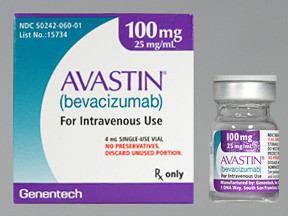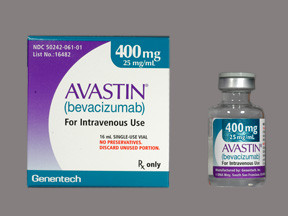BEVACIZUMAB - INJECTION
PHONETIC PRONUNCIATION: (BE-va-SIZ-oo-mab)
COMMON BRAND NAME(S): Avastin
GENERIC NAME(S): bevacizumab
Uses
USES: This medication is a man-made antibody (IgG1) used to treat kidney, cervical, ovarian, colon, and rectal cancer. Bevacizumab is also used to treat lung cancer (non-small cell type), certain types of brain tumors, and cancer found in the fallopian tube or lining of the abdominal wall (peritoneal). This drug works by blocking a certain protein (vascular endothelial growth factor-VEGF) thereby decreasing the blood supply to the tumor and slowing tumor growth.
How to use BEVACIZUMAB - INJECTION
HOW TO USE: This medication is given by infusion into a vein by a health care professional. The first dose is usually given over 90 minutes. If you tolerate the first dose well, then later infusions may be given over a shorter time (60 or 30 minutes). The dosage is based on your medical condition, response to previous therapy, and your weight. Tell your doctor if your weight changes. Use this medication regularly in order to get the most benefit from it. Try not to miss any doses.
Side Effects
Precautions
Interactions
Overdose
Images
Reviews
Faq for BEVACIZUMAB - INJECTION
Bevacizumab is a medication that is used to treat certain types of cancer, including colorectal, lung, kidney, and ovarian cancer. It works by inhibiting the growth of blood vessels that supply nutrients to the tumor, thereby slowing down the growth and spread of cancer cells.
Bevacizumab is typically given as an injection into a vein (intravenous) by a healthcare professional in a clinic or hospital setting. The dosage and frequency of the injections will depend on the specific type of cancer being treated.
Common side effects of Bevacizumab may include high blood pressure, headache, nosebleeds, mouth sores, loss of appetite, weight loss, nausea, vomiting, diarrhea, and fatigue. It is important to inform your doctor about any side effects experienced during treatment.
Yes, Bevacizumab may cause serious side effects such as bleeding or blood clots, heart problems, high blood pressure, kidney problems, bowel perforation, and impaired wound healing. Inform your healthcare provider immediately if you experience any severe or persistent side effects.
Bevacizumab is not recommended for use during pregnancy as it may harm the unborn baby. It is also advised to avoid breastfeeding while receiving Bevacizumab due to the potential risks to the nursing infant. Discuss the potential risks and benefits with your doctor.
The duration of Bevacizumab treatment varies depending on the type and stage of cancer being treated. Your doctor will determine the appropriate duration based on your individual circumstances. Treatment may be given for several months or longer.
Yes, Bevacizumab is often used in combination with chemotherapy or targeted therapy drugs to enhance the effectiveness of cancer treatment. Your healthcare provider will design a treatment plan tailored to your specific needs.
Bevacizumab Injection is used to treat various types of cancer, including colorectal, lung, brain, kidney, and ovarian cancer. It works by slowing down the growth of new blood vessels that nourish cancer cells.
Bevacizumab Injection is administered as an infusion (intravenous) into a vein. It is usually given once every 2 to 3 weeks, depending on the type of cancer being treated.
Common side effects of Bevacizumab Injection may include high blood pressure, nosebleeds, headache, diarrhea, nausea, vomiting, loss of appetite, and tiredness. Serious side effects such as severe bleeding or blood clots may also occur but are less common.
Bevacizumab Injection should not be used by individuals who are allergic to it or any of its ingredients. It is also not recommended for pregnant women, as it may harm the unborn baby.
Bevacizumab Injection may interact with other medications, so it is important to inform your healthcare provider about all the medications you are taking, including prescription drugs, over-the-counter medicines, herbal supplements, and vitamins.
Insurance coverage for Bevacizumab Injection may vary depending on the specific insurance plan. It is recommended to check with your insurance provider to determine the coverage and any potential out-of-pocket expenses.
The duration of Bevacizumab Injection treatment varies depending on the type of cancer being treated. It is usually given as a part of a comprehensive treatment plan, which may include surgery, radiation therapy, or other chemotherapy drugs.
Bevacizumab Injection is not a cure for cancer. It is used to slow down the growth of cancer cells and may help to extend survival in certain cases. It is important to consult with your doctor about the potential benefits and risks of Bevacizumab Injection for your specific condition.
Bevacizumab Injection is generally not recommended for use in children, as its safety and effectiveness in pediatric patients have not been established. However, there may be exceptions in certain cases, and a pediatric oncologist should be consulted.
Warning
WARNING: This medication can rarely cause a tear in the stomach/intestines (gastrointestinal perforation). It may also increase the risk of serious (possibly fatal) bleeding, such as bleeding from the stomach/intestines or in the brain. You should not receive this medication if you have any serious bleeding problems. Get medical help right away if you have any signs of these serious side effects, including bloody or black/tarry stools, persistent or severe stomach/abdominal pain, constipation with vomiting, vomit that is bloody or looks like coffee grounds, coughing up blood, shortness of breath, dizziness/fainting, unusual or persistent tiredness/weakness, severe headache, fever. This medication may also cause wounds to heal slowly or poorly or cause the wounds to break open. It can also rarely cause very serious (possibly fatal) skin and tissue infections that spread quickly. Get medical help right away if you have wounds that are not healing well, a fever, severe pain/redness/heat/swelling at the surgery site or other areas on the skin, fluid-filled blisters in the skin, discolored/scaling/peeling skin, confusion, dizziness, or fainting. You should not receive this medication for at least 4 weeks before and after a major surgery and until the wound from the surgery is fully healed.
Disclaimer
IMPORTANT: HOW TO USE THIS INFORMATION: This is a summary and does NOT have all possible information about this product. This information does not assure that this product is safe, effective, or appropriate for you. This information is not individual medical advice and does not substitute for the advice of your health care professional. Always ask your health care professional for complete information about this product and your specific health needs.


No Reviews Yet